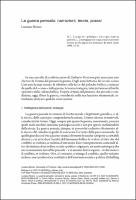Chapter La guerra pensata: narrazioni, teoria, prassi
Abstract
The study of war and strategy has been at the core of the theory of international relations since the birth of the academic discipline. Strategy is a key factor in any conflict, first of all in violent conflicts. Military strategy is the bridge between politics and war. Strategic studies have mainly focused on military doctrines and the means to wage war for too long a time. Limited attention was paid to the cultural dimension of violent confrontations. Then, in the second half of the XX century the Western attention to the technological dimension of war became almost obsessive. However, if war is the continuation of politics by other means we must be aware that the human factor is of utmost importance among those “means”. The willingness of soldiers to sacrifice their life on the battlefield is the precondition to wage war. At the same time, it is also the basis of any political obligation. Hence, death is the continuation of politics by other means. Various “narratives” of war have been created in history in order to justify the individual commitment to fight and eventually die in war to attain political aims. Starting in the classical age the Western world has been developing two related narratives of war: the republican model and the decisive battle one. According to the first one the good citizen was a good soldier too, and vice-versa, while the second required the concentration of violence in space and time to break the enemy’s will to fight in the shortest possible time. The two concepts gave both moral and military sense to the violent, insensate, and chaotic environment of the battle. After the end of the cold war in most Western countries such a way of thinking on the relationship between war and politics has been undermined by several factors, first of all the unwillingness to sacrifice one’s life in war. The readiness to die in order to attain a political aim has almost vanished. On the contrary, the concept of the “decisive battle” has survived thanks to technological evolution. As a consequence, on the one hand, old figures of warriors reappeared on the battlefield: soldiers of fortune, God’s fighters, pirates, and criminals. On the other, the unwillingness to die coupled to the strategic archetype of the decisive battle is bringing more and more machines and AI into war, making it both post-heroic and post-human.
Keywords
war; strategy; culture; death; narrativeDOI
10.36253/978-88-5518-595-0.06ISBN
9788855185950, 9788855185950Publisher
Firenze University PressPublisher website
https://www.fupress.com/Publication date and place
Florence, 2022Series
Studi e saggi, 238Classification
Political science and theory


 Download
Download Web Shop
Web Shop